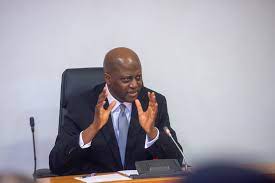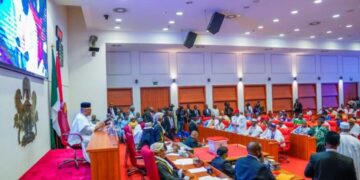According to data from the Nigeria Inter-Bank Settlement System (NIBSS), there are over 19.69 million dormant bank accounts in Nigeria. This information, derived from the industry’s customer account database, tracks monthly account activity throughout 2024. It reveals a consistent rise in inactive accounts, aligning with new regulatory measures from the Central Bank of Nigeria (CBN), which requires commercial banks to disclose details of dormant accounts.
The CBN’s directive aims to enhance transparency and ensure that unclaimed funds are returned to their rightful owners. This comes amidst growing concerns about a large number of accounts remaining inactive for long periods. NIBSS data shows that dormant accounts consistently exceeded 19 million each month since February 2024, with December’s total reaching 19,697,125 inactive accounts. This marks an increase of 1.2 million compared to January’s figure of 18,492,169, reflecting a 6.51% rise over the year.
The peak number of dormant accounts occurred in May and June, when the total reached 20.57 million before slightly declining in the second half of the year. Additionally, the data indicates a rise of 2.08 million dormant accounts in the first six months of 2024, prior to the CBN’s July directive. Following this directive, many affected bank customers visited their banks in large numbers to reactivate their accounts. As a result, dormant accounts dropped by 1.59 million, according to NIBSS data, although they showed a fluctuating increase in the subsequent months.
Closed accounts also saw a steady increase, climbing to 25.48 million in December from 21.71 million in January. In total, 3.78 million accounts were closed throughout 2024. Active accounts grew significantly, rising from 209.31 million in January to 311.65 million by December, reflecting an impressive growth of 102.3 million accounts, or 48.9%.
The CBN has reiterated its directive for banks and financial institutions to publicly disclose details of dormant accounts, unclaimed balances, and other financial assets on their official websites. A dormant account is defined as an account that has been inactive for at least one year. This directive was outlined in a circular issued on Monday and signed by Michael Akuka, on behalf of the Director of CBN’s Financial Policy and Regulation Department.
The circular, titled “Guidelines on Management of Dormant Accounts, Unclaimed Balances, and Other Financial Assets in Banks and Other Financial Institutions in Nigeria”, specifies that financial institutions must display key details such as the names of individuals authorized to operate the accounts, the type of account, and the branch where it is domiciled.
This information must be made available on their official websites. For other financial institutions that do not have dedicated websites, the CBN has mandated that the information be published on the websites of their respective industry associations.
The circular states, “In furtherance thereof, and in response to enquiries from stakeholders regarding the possible breach of the Nigeria Data Protection Act, 2023 (NDPA), banks and other financial institutions are required to note the following.
“1. Section 25 (b) of the NDPA permits justifiable deviations from the general principles of the Act. Also, Section 72. (ii) of the Banks and Other Financial Institutions Act mandates the Central Bank of Nigeria to issue Guidelines on the administration of unclaimed funds in banks and other financial institutions.
“2. Information to be published on banks’ websites, as well as the association’s website (where applicable), shall include the name of the account, the type of account, the name of the bank, and the branch where the account is domiciled ONLY.
“Information to be published annually in at least two national daily newspapers or the premises of State and Unit microfinance banks shall also convey the details as listed in (2) above.”
This directive follows an earlier order issued by CBN on July 19, 2024, requiring banks and financial institutions to transfer unclaimed balances and dormant account funds to the apex bank’s designated accounts.
According to the CBN, all dormant accounts and unclaimed balances with banks for at least 10 years will be warehoused in a dedicated account known as the Unclaimed Balances Trust Fund Pool Account.
The apex bank added that the funds from dormant accounts, and unclaimed balances may be invested in Nigerian Treasury Bills and other government securities.
The CBN, however, said the new guidelines, which is a review of the guidelines issued in October 2015, exempted dormant accounts and unclaimed balances under litigation and investigation.
The guideline reads, “CBN shall treat unclaimed balances (dormant accounts and financial assets) as follows:
“Open and maintain the ‘UBTF Pool Account’, maintain records of the beneficiaries of the unclaimed balances warehoused in the UBTF Pool Account.
“Invest the funds in Nigerian treasury bills (NTBs) and other securities as may be approved by the ‘Unclaimed Balances Management Committee.
“Refund the principal and interest (if any) on the invested funds to the beneficiaries not later than 10 working days from the date of receipt of the request and where it is imperative to extend the timeline, a notice of extension shall be communicated to the requesting FI stating reasons for the extension.”
Justifying this move, the Governor of the Central Bank of Nigeria, Olayemi Cardoso, said that monies in dormant accounts in banks are susceptible to fraud.
At the end of the 296th meeting of the Monetary Policy Committee in Abuja, Cardoso said, “With respect to dormant accounts, what I found personally is if you leave accounts dormant in banks, sometimes more than when you don’t leave them dormant in banks. In fact, most times, they are more susceptible to fraudsters copying your identity and trying to gain hold of the system to grab your money. So, that is a problem I think most money banks face.”
“The policy and the directive are meant to ensure that all those monies come to the central bank for safekeeping and it is at zero cost to the beneficiaries. All that will happen is that the central bank will manage the money within our possession and when the rightful owner surfaces, the money is returned plus whatever income is accrued to you.”
The increasing number of dormant accounts raises concerns about financial inclusion and banking engagement strategies
While the rise in active accounts suggests strong banking adoption, the persistently high dormant and closed account numbers indicate that financial institutions need to re-evaluate their customer retention approaches.
While there is no latest figure on the total value of unclaimed funds in dormant accounts, the former minister of finance, budget and national planning, Zainab Ahmed, earlier said that the Federal Government would have access to as much as N850bn from the special trust fund of unclaimed dividends and dormant account balances.
She said, “On the issue of unclaimed dividends and government’s accounts and projections, there would be as much as N850 billion to be realised into the special trust fund of unclaimed dividends.
“The government is keeping the money in trust for the beneficiaries. At any time, a registrar or a bank confirms that this is the true and bonafide beneficiary of this fund, then the government will release from that trust fund to the investor who has it.
“They have nothing to lose as they would be paid their entitlements from the special trust fund to be set up by the federal government once they are properly identified.”

Address: No 5 Ejembi Eko Street, New GRA, Makurdi, Benue State, Nigeria






